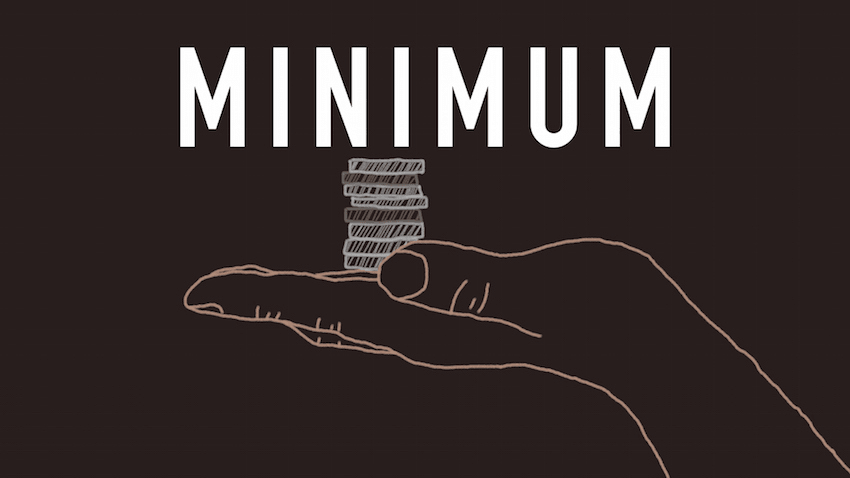61% of people working on the minimum wage in New Zealand are women. RNZ’s new documentary series Minimum gives a voice – and more importantly, a face – to these women. Sam Brooks reviews.
In 2017, there were roughly 76,400 people on minimum wage in New Zealand (which was $15.75 an hour at the time), and an estimated 164,100 people earning $16.50 (which is the minimum wage today). Of those on the minimum wage, 61% of them were women.
We think of percentage and dollar signs as things that exist in our bank account, or in boring equations in maths class. To attach these dollar signs to a human face and another human’s reality is a difficult jump, especially when we’re reading them in the news (even though I’d argue it’s not being reported on nearly enough). Humans have been conditioned to think of numbers as numbers, and to make the jump from statistics to someone’s lived experience becomes an increasingly difficult one the more we get bombarded with them.
Minimum, produced for RNZ by Notable Pictures, with the support of Loading Docs and funding from NZ on Air, is the essential, heart-rending bridge between these particular statistics and that reality. It gives us Charmaine and Victoria, two cleaners. It gives us Lavina the security guard and Rose the aged care worker. In its most heartbreaking segment, it gives us Roszanne, a carer whose entire life was changed by the Equal Pay Act.
It’s hard to understate the value of a project like Minimum. The bulk of minimum-wage work is done by women, according to what the statistics above say. What those statistics don’t say is the weight of that labour on the women who do this minimum-wage work. Minimum gives us that weight and it does so in showing their humanity. An audience might already have a narrative built up about the kinds of women who do minimum-wage work – they’re immigrants, they’re undereducated, they have X problem or Y issue, and Minimum decimates those. Everybody has a story and they’re worth listening to, these women’s stories most of all.
The spectrum of women that Minimum interviews isn’t just important and illuminating – it’s necessary. It’s very much a documentary that recognises that feminism and equality apply to all women, not just the ones we hear from and the ones we see. We hear from Sylvie, a young barista. We hear from Wendy, a bus driver, who’s been doing her job for ages. And in the series’ most enervating episode, we hear from Shreya and Tarranum – two 1.5 generation immigrants who share a bedroom together, and simultaneously lift up and support each other. It’s a showcase of solidarity, but also an implied warning shot: inequality doesn’t die in the generation before us, and it doesn’t stop just because we’re aware of it. It stops because we do something.
As Charmaine says in one of the earliest episodes, “If it wasn’t for the little people you couldn’t be in that big chair.”
Minimum is also helped by its empathetic, and genuinely heartfelt, production. It would’ve been very easy to be a talking heads documentary, and it would’ve been incredibly affecting at this, because it’s hard to watch these women talk and listen to their stories and not let it sink in your pores right to your soul. The makers haven’t just thought about the statistics, but the results of those statistics.
But there’s an artistry here, namely in the form of animation from Nick Setteducato, Lea Dambeck and Trees Neal which literally illustrates what each woman goes through in her day-to-day working life in an emotive watercolour style. It does on a smaller scale what Minimum does on the whole – serving as a bridge between the words the women are saying and the life they’re living every day. It doesn’t capture the factual reality of what each of these women work through (it’s animation, not photography) but it does capture the emotional reality. It’s something only art – not statistics – can do.
Minimum also makes the wise choice of allowing the interviewer to interject and follow-up every now and then. It’s not necessarily that we need the interviewer’s input, but that it allows it to feel like a conversation and dialogue. These women aren’t screaming into the void. They’re not speaking into an unfeeling, exploitative camera. They’re talking to another woman, another human being. A dialogue is how things change, and Minimum realises this. It also gives the interviews a conversational feel, which clearly puts each interviewee at ease.
Minimum is a triumph of not only the genre, but of the short doco series form. It distils the experiences of a spectrum of women down to a few minutes each, and by making a collage of these different experiences it builds up an implicit argument: these women are strong, these women are worthy, and the work they do is important. Society doesn’t exist and doesn’t function without them. If you look at the 61% number and don’t feel anything, you’re dumb. If you look at these women and listen to what they have to say and don’t feel anything or do anything, you’re flat-out complicit.
But the most important and necessary triumph of Minimum is that it doesn’t give us ‘another side’. Because there is no other side: Hear these women, value these women, and do better by them. Individually and on the whole.
You can watch Minimum at RNZ right here. The first four episodes are available already, and the rest will be made available throughout the rest of this week.
